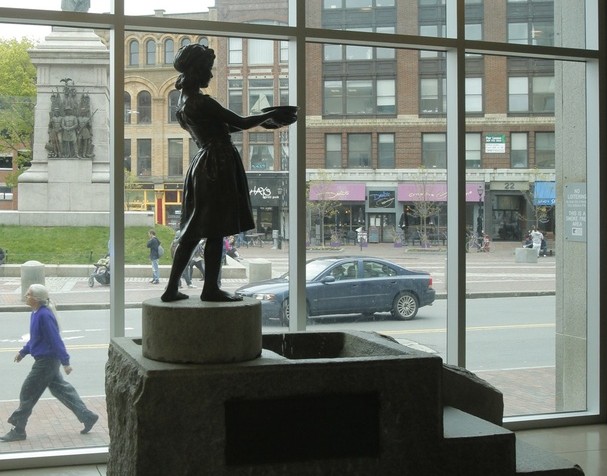AUGUSTA – If a book features sexual content or homosexuality, profanity or racial slurs, magic or violence, chances are someone has tried to have it removed from a library shelf or school reading list.
Every year there are hundreds of challenges to books or other materials by people who want to see them barred from libraries or classrooms — a fact that libraries have highlighted this week during Banned Books Week, the American Library Association’s annual celebration of the freedom to read.
Many schools and public libraries in the Augusta area have received complaints about certain books, but they rarely have risen to the level of a formal challenge, according to librarians and other officials.
Elizabeth Pohl, director of Lithgow Public Library in Augusta, said there have been perhaps four complaints in her 23 years at the library, all of which were resolved after conversations with the library staff.
“Oftentimes, I’ve found in this community, they just want to be heard and for the library staff to understand that not everybody finds everything appropriate that’s in the library,” Pohl said. “For the most part, our users are very respectful of the role the library plays in the free flow of information.”
While there have been some high-profile cases in Maine, attempts to ban books seem to be less common here, said Jim Campbell, chairman of the Maine Library Association’s Intellectual Freedom Committee.
“Mainers, in my observation, are very much committed to letting people get along on their own as much as possible and not try to impose their will on others,” Campbell said.
Among the complaints at Lithgow, Pohl said, the only one she remembers specifically was about “It’s Perfectly Normal: Changing Bodies, Growing Up, Sex and Sexual Health.”
Pohl said a woman expressed concerns about the book in 2007 or 2008, around the same time that a woman was charged with theft for refusing to return the same book to the Lewiston Public Library because she thought it was obscene.
All Maine school districts are required to have policies about the selection and review of educational materials, including a process for challenges to materials. Typically, challengers must speak first with the person providing the item. If they are not satisfied, they can fill out a form outlining their objections, and the challenge is reviewed by a committee appointed by the superintendent.
The review committee makes recommendations to the superintendent, and the decision can be appealed to the school board.
Regional School Unit 2 Superintendent Virgel Hammonds said a library worker in the school district received one such individual request, from a woman asking that her children not be allowed access to the “Harry Potter” or “Twilight” series in the school library.
Since August, activists and officials in at least three states have objected to the inclusion of certain books, such as Toni Morrison’s “The Bluest Eye” and Cristina Garcia’s “Dreaming in Cuban,” on recommended reading lists linked to the nationwide Common Core learning standards.
Susan McMillan can be contacted at 621-5645 or at:
smcmillan@mainetoday.com
Send questions/comments to the editors.



Success. Please wait for the page to reload. If the page does not reload within 5 seconds, please refresh the page.
Enter your email and password to access comments.
Hi, to comment on stories you must . This profile is in addition to your subscription and website login.
Already have a commenting profile? .
Invalid username/password.
Please check your email to confirm and complete your registration.
Only subscribers are eligible to post comments. Please subscribe or login first for digital access. Here’s why.
Use the form below to reset your password. When you've submitted your account email, we will send an email with a reset code.